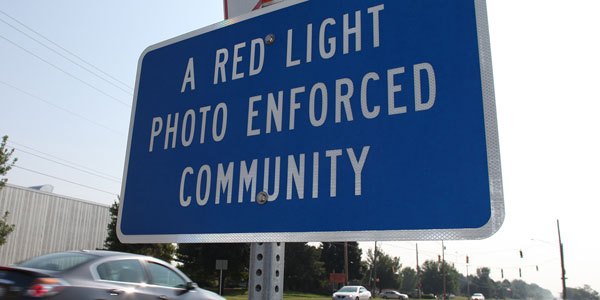California: Red Light Camera Class Action Lawsuit Hits Federal Court
A class action lawsuit against fifty-nine red light camera programs in the state of California will be heard before Judge William H. Alsup in the US District Court for the Northern District of California. Attorney Bruce L. Simon, who is suing Redflex Traffic Systems and American Traffic Solutions (ATS), moved Friday that the case return to the state court system. Simon argues that the contracts of Redflex and ATS with municipalities are illegal under California law.
Simon had initially filed the case on behalf of motorist S.D. Jadeja in the San Mateo County Superior Court, a venue that has already ruled that red light camera cost-neutrality contracts violate state law ( view decision). The class action suit is designed to go after the companies profiting from this type of illegal arrangement. ATS moved last month to have the case heard in federal court where judges have ruled more favorably toward automated ticketing machines. Simon wants the case back in the state courts.
“More than two-thirds of the putative class members are citizens of California, all of the alleged harm and wrongdoing occurred in California, the claims are based entirely on California law, and one of the three defendants [i.e., Redflex] is a citizen of California whose actions form a significant basis for the claims here and against whom plaintiff seeks significant relief,” Simon wrote in his motion to remand the case back to San Mateo.
Simon points out that Redflex, an Australian company, calls itself a California-based firm in 62 percent of the contracts it signed in the Golden State. The language variously refers to “Redflex Traffic Systems (California),” “Redflex Traffic Systems, Inc., a California corporation” or lists its principal place of business as Culver City, California. Under California law, class action cases designated as a “local controversy” are to be heard in state, not federal, court. Simon argues that every aspect of the case is local.
“All of the alleged conduct occurred in California and all harm and damages were suffered in California,” Simon wrote. “The cornerstone of this case is the existence of unlawful contracts, and the operation of automated traffic enforcement equipment under those contracts, in violation of both the California Vehicle Code and California Business and Professions Code.”
Under the cost neutrality clause, Redflex and ATS are compensated at a rate of 100 percent of the ticket revenue collected up to a certain amount. Beyond that cap, the city keeps all revenue. The California Vehicle Code specifically prohibits red light camera contractors from being compensated based on the amount of revenue collected. For that reason, Simon wants every ticket issued under a cost-neutrality contract refunded, an amount that could reach into the hundreds of millions of dollars. San Mateo County, for example, reported $13,802,808 worth of red light camera tickets last year alone.
[Courtesy: Thenewspaper.com]
More by The Newspaper
Latest Car Reviews
Read moreLatest Product Reviews
Read moreRecent Comments
- Bd2 Ultimately, it comes down to price/whether it makes financial sense for buyers (right now, BEVs just aren't there, even with the tax credit). HEVs are finally seeing their place in the sun, decades after being a niche market; this is due to premium for HEVs having narrowed significantly with pure ICE, whereby buyers can recoup that after 2-3 years of ownership.
- MaintenanceCosts I've experienced three cars that were the first year of the model. The two I bought (first-off-the-boat 2004 TSX and midyear 2006 Civic) were both Hondas and were both flawless. The other one was my ex-stepmother's 1990 Land Rover Discovery. It was one of the very first Euro-spec models, a two-door with an asthmatic carbureted 3.5L V8 and a five-speed manual. Every part of the car broke at some point, including things like hatch hinges that really shouldn't break. It turned her off Land Rover forever, and her cars since have all been Subarus.
- MaintenanceCosts When I was living with my Bolt in a rental condo and charging from 120V in the garage, as soon as the association figured out what was happening, they asked me to pay $30 a month to cover the cost. That's pretty close to what I was using so I had no issue with it.
- SCE to AUX I've had mixed results with first-year cars:71 Pinto - good. 85 LeBron GTS - good. 96 Grand Voyager - good. 02 Passat B5.5 - bad. 05 Odyssey - bad. I also had a last-year car that was terrible (80 Bobcat), but most cars were crap then, anyway.
- Crown Go big or go home. Never understood the "economy version" that manufacturers make of a performance car.


































Comments
Join the conversation
Nice. I hope he wins.
Aside from dreams of revenue, why do politicians OK the cameras? 1. They think we like the cameras! Last week a blog exposed Astroturf Lobbying in the red light cam Industry. (To read it, Google Rynski and Astroturf.) Astroturf Lobbying is when a PR firm creates an artificial grassroots movement via comments posted on news articles like this one. The politicians, sensing strong community support (they read these comment columns too), give the OK for cameras. 2. Politicians are immune to the tickets! In California 1.5 million privately-owned cars have plate numbers protected from easy look up, effectively invisible to agencies trying to process red light camera violations. Such "protected plate" lists exist in other states. (In CA the list includes local politicians, bureaucrats, retired cops, other govt. employees, and their families and ADULT children!) Everyone should check to see who and how many are 'protected' in their state.